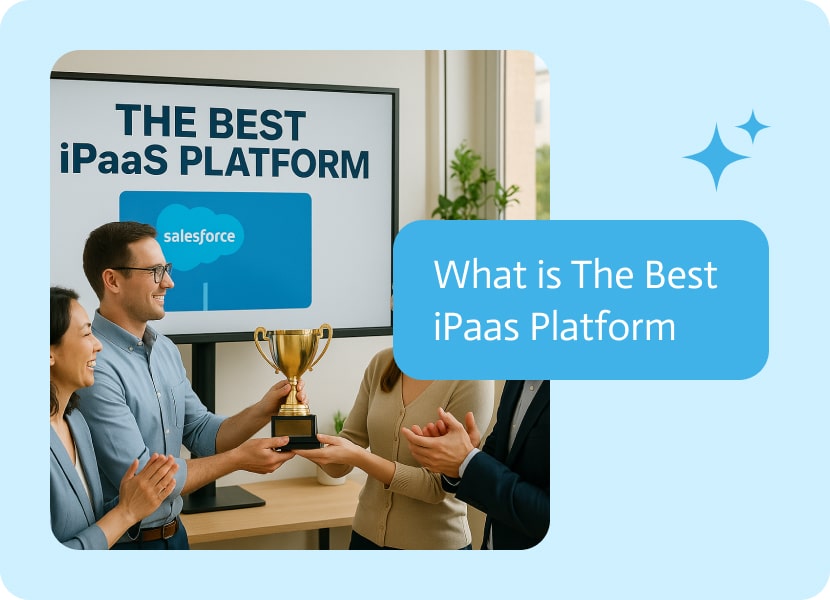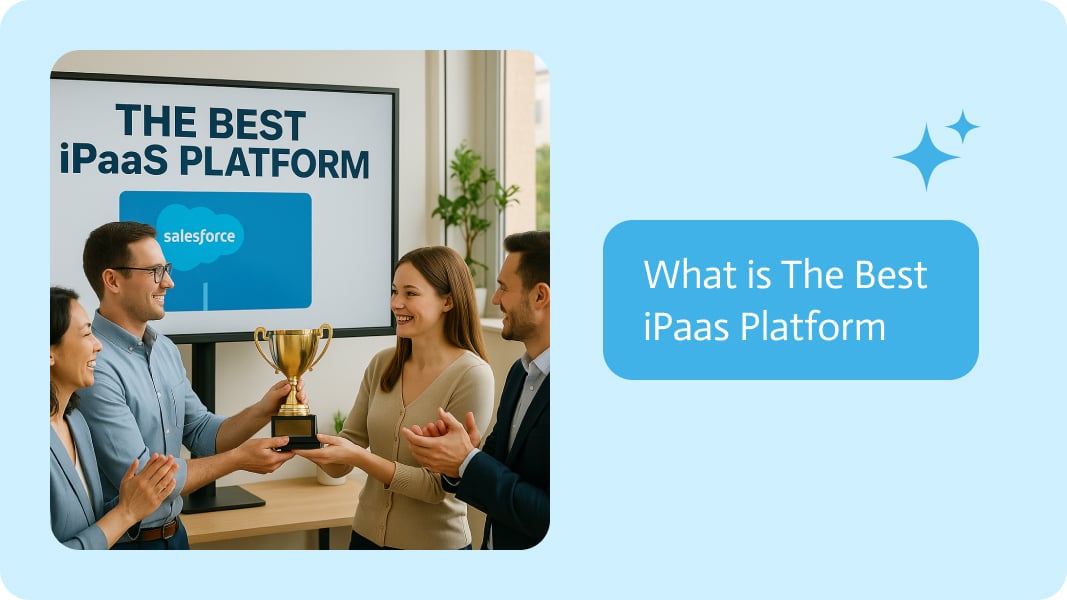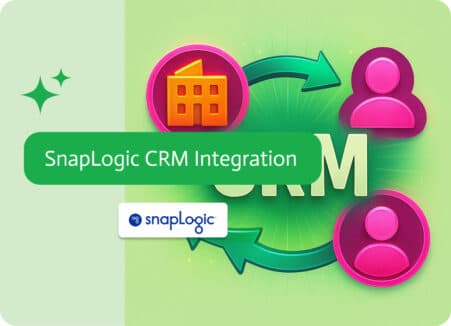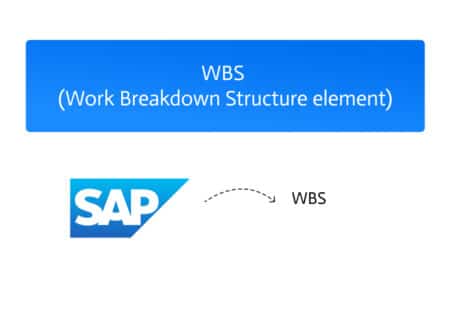

What is The Best iPaas Platform
Integration Platform as a Service (iPaaS) solutions are now a must-have for businesses that want to connect different apps, make workflows automatic, and easily move data between cloud and on-site systems. The iPaaS market is expected to hit $13.9 billion by 2026, with a growth rate of 30.3% each year. Because of this, picking the correct platform is very important. It can change how well you work, how much you can grow, and how well you adapt to digital changes. So, what makes one iPaaS platform better than another? To find out, we need to think about things like how easy it is to use, what it can connect to, how well it grows, pricing, and special uses for it. In this article, we’ll look at the top iPaaS platforms of 2025, using the latest information to help you decide which one is right for your company.
What is an iPaaS Platform?
An iPaaS is a cloud-based service that connects apps, data, and processes, which basically allows data to move smoothly and automatically between all your different systems. It usually has, well almost always has ready-made connectors, simple drag-and-drop interfaces, and data that updates in real-time. This cuts down on manual tasks and makes things work better. iPaaS platforms are made for all kinds of users, from people who aren’t tech-savvy to IT experts. They can be used for things like syncing customer info, making order processes automatic, and linking old systems with new cloud apps.
Think about whether your company has issues with entering data by hand, systems that don’t connect, or needing real-time data analysis. The correct iPaaS should fix your specific problems, whether that means making integrations easier for a small team or handling big, complicated workflows for a large company.
Key Things to Look for in iPaaS Platforms
To find the best iPaaS platform, let’s check out the important things you should consider:
- Ease of Use: How simple is the platform for both tech and non-tech people? Can regular employees use it without needing to code?
- Integration Options: Can the platform connect to many different things, like pre-built connectors, custom integrations, and both cloud and on-site systems?
- Scalability: Can the platform handle more data and integrations as your business gets bigger?
- Pricing and Value: Is the pricing clear, and does it fit your budget and what you need to connect?
- Performance and Reliability: Does the platform process data in real-time and have good tools for handling mistakes and keeping track of things?
- Security and Compliance: Does it follow rules like SOC 2 Type 2 or GDPR?
- Support and Community: Can you get help easily, and is there a group of users who can offer advice?
Think about: Which of these things is most important for your company, and why? Is ease of use more important for a small team that doesn’t have many tech skills, or is scalability the main thing for a growing company?
Top iPaaS Platforms in 2025: A Quick Overview
Today, businesses use many different apps to handle things like sales, marketing, finance, and shipping. The problem is making sure these apps can talk to each other and share information without problems. That’s where iPaaS solutions come in. They act like the link that connects all these different systems. Here’s a look at six of the top iPaaS platforms, based on what they offer, what they’re good at, and who they’re best for, using the latest information from industry experts.
1. Noca
Noca is a no-code iPaaS platform that uses AI to make automation easy for everyone, not just tech experts. It uses AI and language processing to simplify complicated integration tasks. This lets users create and manage while improving workflows with an easy-to-use interface. Noca’s AI can automatically match data fields, suggest workflows, and improve automation, which takes away a lot of the guesswork in integrations. The platform has tools like the AI Integrator for connecting apps and databases, the AI Flow Designer for automating processes, and the AI Field Mapper for making sure data is correct.
Noca works for all sizes of businesses, with different pricing options from a free plan for individuals to custom solutions for big companies. Its no-code approach and AI features make it very easy to use, and its security and scalability mean that it can handle big, complicated workflows. Noca is a great tool for companies that want to make their operations smoother and let their employees handle their own automation projects.
2. Zapier
Zapier is a popular no-code automation platform for small businesses and individuals. It has over 8,000 app connectors, letting users create Zaps that automate tasks between tools like Slack, Google Sheets, or even Salesforce for that matter. Its drag-and-drop interface is easy to use and doesn’t require any coding skills. Zapier is great because it’s simple and has lots of connections, so you can quickly set up easy workflows.
But it doesn’t scale very well and might not be the best choice for complex integrations in large companies. It has a free option, but the better features cost more, which might not be worth it for bigger organizations. Zapier is best for startups and small businesses that need quick integrations for common business apps and don’t have coding experts on staff. It makes you wonder: How useful is a no-code platform like Zapier for a team that doesn’t have tech skills? And when do its limits become a problem?
3. Boomi
Boomi is an iPaaS designed for big companies that need to manage hybrid cloud setups. It has strong tools for connecting old on-site systems with cloud-based apps, which is important for many large organizations. The platform features a drag-and-drop interface for creating complex integrations, real-time data syncing, and detailed monitoring and analytics to track how well things are working. Boomi’s pre-built connectors work with many different apps and databases, making it a powerful and scalable solution.
Boomi has a lot of features, but its pricing can be confusing and not very clear. You often have to talk to a sales team to get a quote. It can also be hard to learn for users who want to do advanced customizations. Boomi is a good fit for medium to large companies, especially in industries like finance and healthcare, where data security and managing hybrid environments are critical. If your company uses both cloud and on-site systems, Boomi’s hybrid features can solve your integration challenges.
4. MuleSoft
MuleSoft, which is owned by Salesforce, is a big player in the iPaaS market. It’s known for its API-led connectivity and focus on enterprise customers. It’s especially good for companies that use Salesforce a lot. The platform has a full set of tools for creating and managing APIs, which allows for smooth integrations driven by APIs. It offers many automation templates, a central dashboard for managing all integrations, and AI features for smarter automation.
MuleSoft’s API-first approach is great for complex, large-scale integrations and is a big advantage for enterprises that are focused on API management. The platform is highly scalable and offers strong monitoring. But, its pricing can be complex, and its learning curve might be too steep for non-tech users and smaller businesses. MuleSoft is the preferred choice for large enterprises with a strong Salesforce presence and a strategy focused on API management.
5. Workato
Workato balances ease of use with powerful automation by combining integration with an AI engine. You can manage all your integrations and automations from a single dashboard. Its RECIPE IQ engine uses AI to make workflow creation simpler and easier, so both IT pros and regular employees can use it. Workato offers real-time monitoring, version control, and many pre-built connectors for popular apps like Salesforce, Slack, and Zoom.
This platform is praised for its AI features and how it lets both tech and non-tech teams do more. Workato scales well and is known for being user-friendly, but it can be expensive for businesses that have to handle a lot of data. Workato is a great fit for mid-sized to large businesses that need a powerful, AI-driven automation solution that can be used by many different people. It makes many organizations wonder: How would AI automation, like Workato’s RECIPE IQ, help your team manage integrations more efficiently?
6. Celigo
Celigo is a modern iPaaS platform that’s known for being simple and having lots of pre-built connectors. This makes it a popular choice in the e-commerce world. Its user-friendly interface makes integration setup easy, and its ready-to-use connectors allow for quick setup. Celigo offers real-time data syncing and strong automation features to make key business processes run smoother, especially those that involve e-commerce platforms like Shopify and NetSuite.
The platform’s strengths are that it’s easy to use and has powerful connectors for e-commerce. This has led to high user satisfaction. But, some users have said that it can be slower to process very large amounts of data compared to other options, and advanced customizations might require tech skills. Celigo is a great solution for e-commerce businesses and mid-sized companies that want simple, scalable integrations with minimal setup time. It’s a good platform for businesses that can use its specialized pre-built connectors for platforms like Shopify.
Choosing the Best iPaaS Platform
The best iPaaS platform depends on what your company needs:
- Small Businesses and Startups: Noca’s and Zapier’s no-code interface and affordable pricing make them great for quick, simple integrations.
- Enterprises with Hybrid Systems: Boomi and Noca are excellent at connecting cloud and on-prem apps and can scale for complex environments.
- Salesforce-Centric Organizations: Noca and MuleSoft’s API-led approach and Salesforce integration make them top choices for enterprise-level needs.
- Businesses Seeking AI Automation: Workato and Noca’s AI engine and user-friendly design are good for companies that want a balance of ease of use and advanced automation.
- E-commerce Businesses: Celigo’s simplicity and e-commerce connectors make it perfect for making online operations smoother.
Always ask yourself what you want most from an iPaaS platform: saving money, scalability, ease of use, or advanced automation? How does this affect your choice?
Other Things to Consider
- Security and Compliance: Make sure the platform follows rules like SOC 2 Type 2 or GDPR, especially if you’re in industries like healthcare or finance. Boomi, MuleSoft, and Workato have strong security features.
- Support and Documentation: Platforms like Zapier and Celigo have lots of documentation and support from the community, while Boomi and MuleSoft offer dedicated support for enterprises.
- Preparing for the Future: Choose a platform that can grow with your business and connect new tools without causing problems. Workato and Boomi are very strong in scalability.
Also, think about how your integration needs will change over the next 3–5 years and which platform is best set up to handle that growth.
The Rise of the Digital Employee
A digital employee is essentially an AI-powered assistant that can take over routine, repetitive tasks within your business processes. In the context of iPaaS, it acts as a virtual team member, handling data transfers, syncing systems, monitoring workflows, and even suggesting optimizations. This means your human employees are freed from manual, time-consuming integration work and can focus on higher-value strategic tasks. Platforms like Noca turn automation into an intelligent digital employee, capable of learning from patterns, reducing errors, and ensuring that your operations run efficiently and consistently, 24/7.
Conclusion
Choosing the right iPaaS platform can transform how your business operates, not just by connecting apps and automating workflows, but by effectively creating a digital employee that handles repetitive tasks, monitors data flows, and ensures processes run smoothly. Platforms like Noca leverage AI to act as this digital employee, helping both technical and non-technical staff manage integrations, optimize workflows, and maintain accuracy without constant manual oversight. By pairing human insight with a digital employee, businesses can increase efficiency, reduce errors, and free their teams to focus on strategic, high-value work. Ultimately, the best iPaaS aligns with your organization’s size, goals, and technical capabilities, giving you a reliable partner in achieving growth and innovation.


